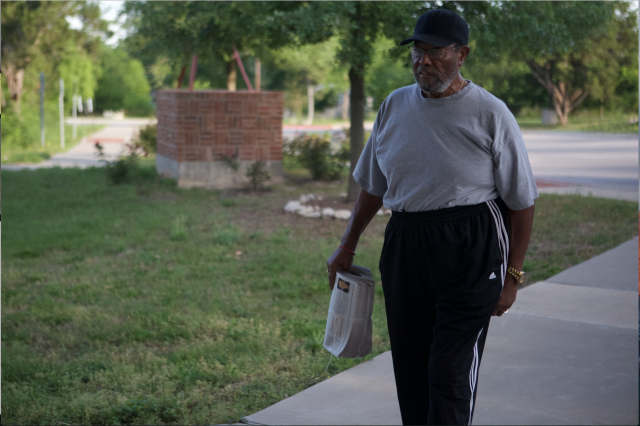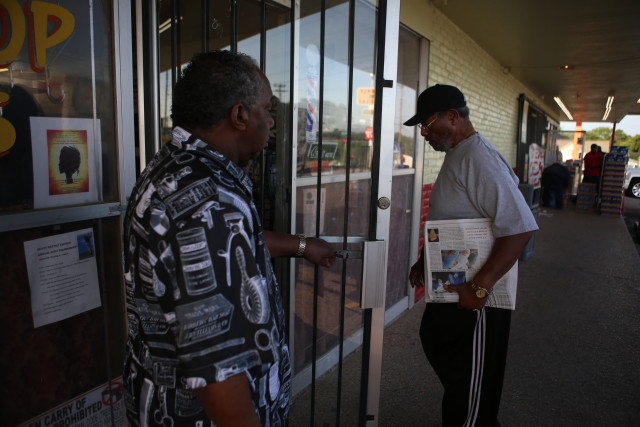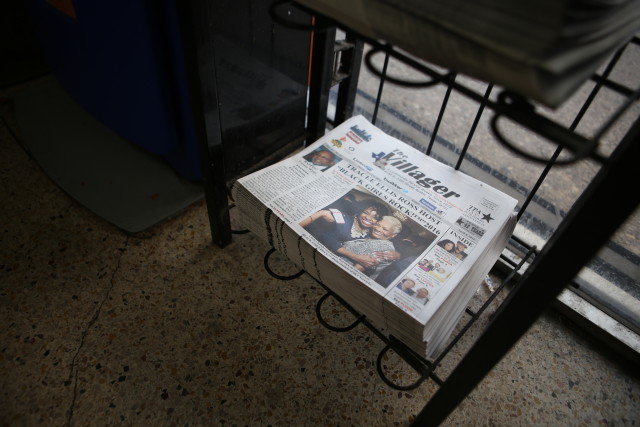As East Austin Changes, The Villager Perseveres as a Voice for African-Americans
By Destinee Harrison
Reporting Texas

Grayson Crayton distributes The Villager, a weekly that focuses on news and issue of interest to African Americans. He’s starting his morning route in East Austin. Destinee Harrison/Reporting Texas
To say Tommy Wyatt is a survivor in Austin publishing circles is an understatement. Wyatt started his weekly community newspaper, The Villager, in May 1973. Today, working out of a nondescript, one-story office building on East 12th Street near I-35, he’s still at it, keeping his readership up to date on issues of interest and concern to the African-American community.
At the same time, Wyatt’s world has changed beyond recognition. Back in the day, East Austin supported a flourishing community of black-owned restaurants, churches, stores and boutiques whose advertising helped The Villager get a foothold in the community and keep a finger on its pulse. Today, with rising real estate prices pushing longtime residents toward the suburbs, black-owned businesses have dwindled along with the African-American population.
For all that, Wyatt said his business is as good as ever. The Villager always has operated on something of a shoestring. Wyatt prints 6,000 copies every week and distributes them free of charge at nine H-E-B locations and several black-owned local businesses, a print run he says that hasn’t changed since the paper’s launch back in the 1970s.
The difference is The Villager’s move to online a half-dozen years ago. “My son is the webmaster and handles all of the electronic stuff,” Wyatt said. “So now … if you live in China or Timbuktu, you can still read our paper.”
However, like other publishers, Wyatt has found that greater reach on the Internet doesn’t necessarily mean an online advertising bonanza. But Wyatt says his paper’s online presence has helped stabilize advertising revenue.
“If anything, it’s helped maintain our supporters,” Wyatt said. “Now advertisers know they are not limited by geographical locations.”
Being both a print and online publication has also helped The Villager maintain its readership. As African Americans have moved out of East Austin to places such as Pflugerville and Round Rock, Wyatt has adjusted the print paper’s distribution route to reach them.
“Austin has changed a lot,” Wyatt said. “They moved all the black folks out. But this hasn’t affected our readership,” he said. “We still get complaints that the newspapers are leaving the stands too fast.”
That continued momentum allows The Villager to employ six reporters and a distribution manager. Wyatt’s staff looks for stories from around the state and nation and then finds ways to relate them to Austin’s black community. A story in the April 22 issue, for example, focused on two alumnae of Spelman College in Atlanta who are moving to Austin to take positions in Division of Diversity and Community Engagement at the University of Texas at Austin. A few articles also come from other publications that are members of the Texas Publishers Association, which represents black-owned papers, and the National Newspaper Association, which represents community weeklies.

Crayton delivers papers at a barbershop on East Martin Luther King Boulevard. Rising real estate prices and other forces have caused many African Americans to move to Austin’s suburbs, so the paper also has an online edition. Destinee Harrison/Reporting Texas
Citing “proprietary reasons,” Wyatt says he prefers not to disclose the dollar amount associated with running The Villager, but allows that the paper today relies heavily on the support of mainstay advertisers such as Huston-Tillotson University and Capital Metro.
There’s no denying that the city’s demographics shifts have presented Wyatt with challenges in keeping The Villager afloat. In 1960, nearly 15 percent of Austin’s 186,000 population was African American. By 2010, blacks were only 8.1 percent of the city’s 790,390 residents, according to the U.S. Census – and by 2013 their numbers had reduced by almost another full percentage point, according to data on the city’s website.
Wyatt is no stranger to dramatic social change. As the child of migrant cotton workers during the Jim Crow era in the Deep South, it didn’t take long for him to become politically active during his years at Bishop College in Marshall in the 1950s.
“Everybody was involved in the civil rights movement,” he said. “Back then [being beaten by the police] wasn’t called brutality. That was just the way they controlled us. They would get the water hose out on the courthouse square, turn it on and wash you away… That water hose was powerful stuff.”
That public mistreatment, Wyatt says, strengthened his involvement with the black community and eventually pushed him toward a career in journalism. In 1962, Wyatt joined Austin’s Capitol City Argus, a black newspaper known for being “a responsible voice in the black community,” according to the Library of Congress.
By the time the Argus folded in 1969, Wyatt was involved in local politics. He twice ran unsuccessfully for Travis County Precinct 1 commissioner, failures he says came as a wake-up call. “I felt that one of the main reasons I was unsuccessful in my campaign was that I did not have a way of communicating with the black community,” Wyatt said. “So I decided that I would try to put together a newspaper.”
Over the years, The Villager has built a stable readership of people such as Chantal Eldridge, a 51-year-old criminal defense attorney in Austin. “It has a really good circulation for a minority paper,” she said. “They really try to give a lot of highlights on what’s happening in the African-American community and minority communities.”
In a recent issues, The Villager has covered the death of hip-hop legend Tupac Shakur’s mother, Afeni Shakur and profiled a Huston-Tillotson graduate, Oumar Dijba, a former collegiate and professional soccer player who opened a soccer training camp for area youth.
Yet according to Wilhelmina Delco, the first African American elected to the Austin Independent School Distrct board and later a 10-term state representative, “It’s difficult to have a black publication in East Austin, especially with gentrification. There was a time when almost anything that was happening to black people was happening in East Austin. And now we are moving out, and the communities that once were black no longer are.”
And the city’s attitude toward race hasn’t helped, said Joshunda Sanders, a former reporter for the Austin American-Statesman now living in Washington, D.C. “Because [Austin] is a liberal city in a conservative state,” she said,” it gives room for them to say, ‘Well, we are weird, so we don’t handle race issues or equality the same way as other cities.
But Sanders added: “It’s a cop-out. Nor is it a conducive environment for black businessmen and women.”
Sanders used to read The Villager, she says, and appreciates black newspapers historic role in giving voice to Austin’s black community. “But things are different now. The toll that integration has taken on black press presents a very significant challenge.”

Copies of The Villager arestacked at a gas station in East Austin. Destinee Harrison/Reporting Texas
Akwasi Evans knows the struggle well. In 1987, Evans founded Nokoa: The Observer, known for its politically charged articles about racial and social injustice. “The real problem is money,” he said. “Most African Americans don’t earn a living wage and can’t afford to live here, and black businesses have not received reciprocity for the dollars spent in the city…Very few dollars have been spent with us.”
What does the future hold? Thomas Wyatt Sr. said he hopes to pass the business on to Thomas Wyatt Jr., who has been working with his father at The Villager for more than 30 years. “Between my son and my two granddaughters, hopefully they will keep it together,” he said. “But then again, that is just one of those things you can hope.”